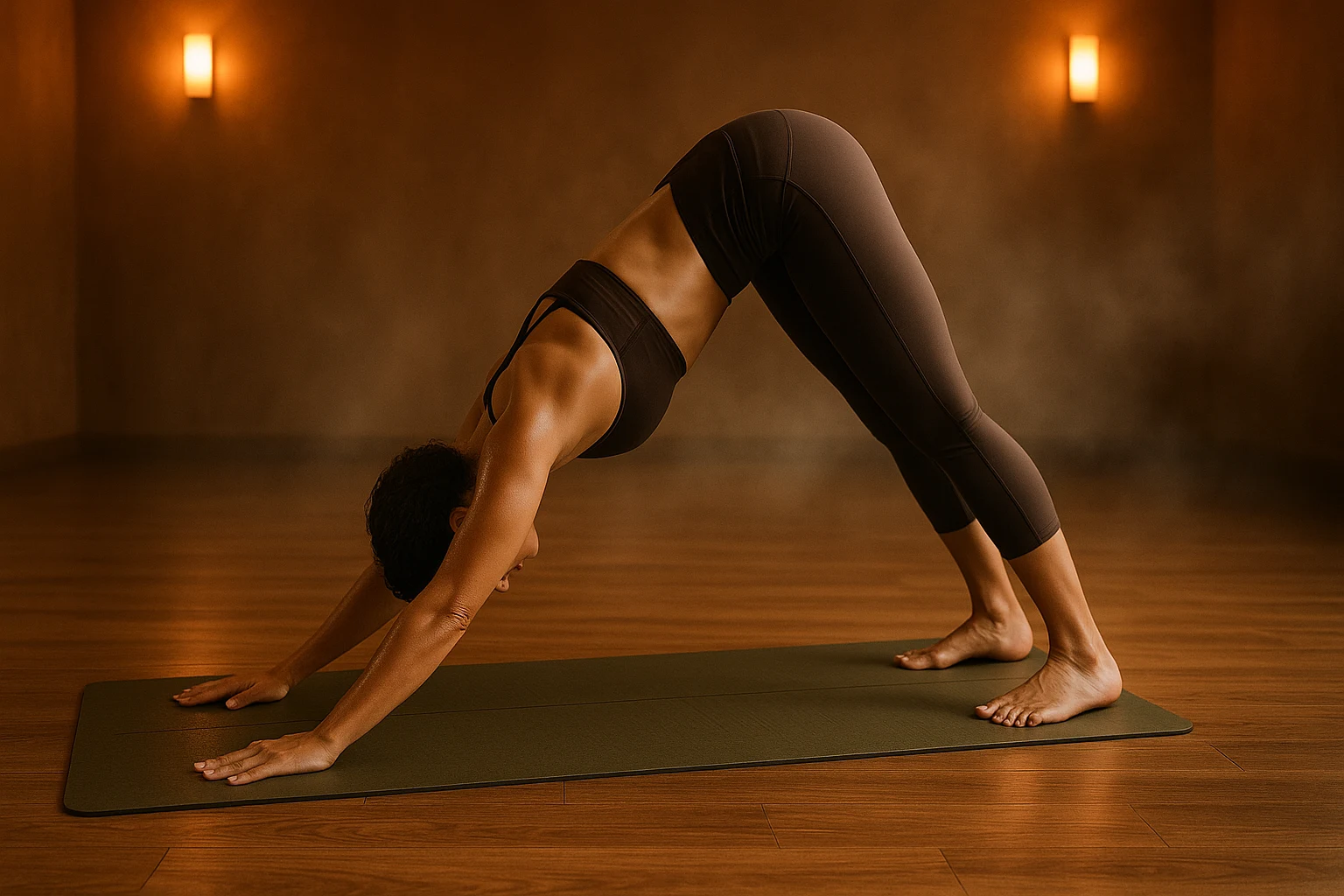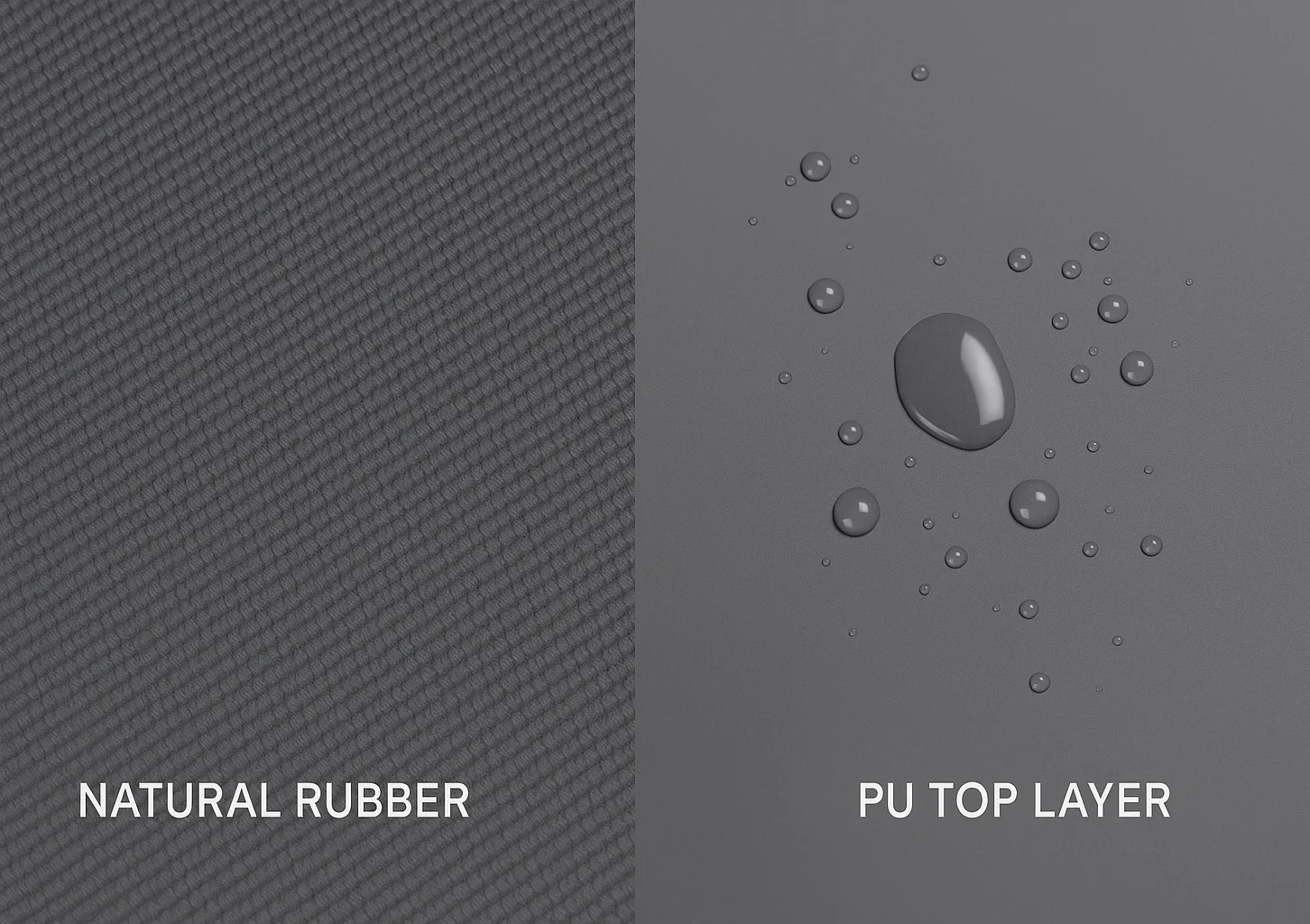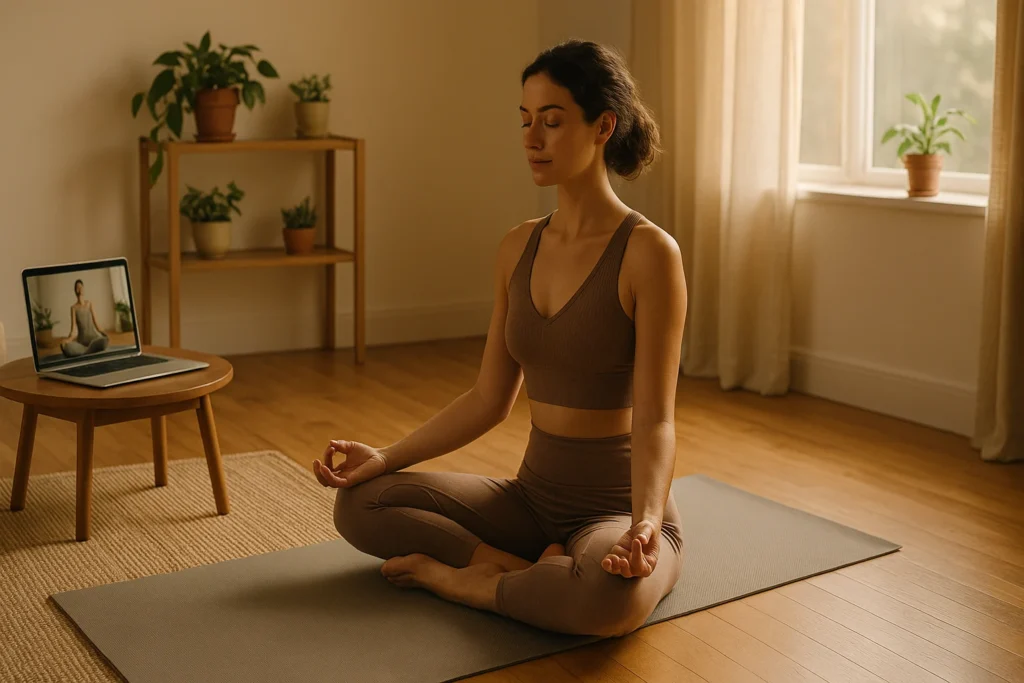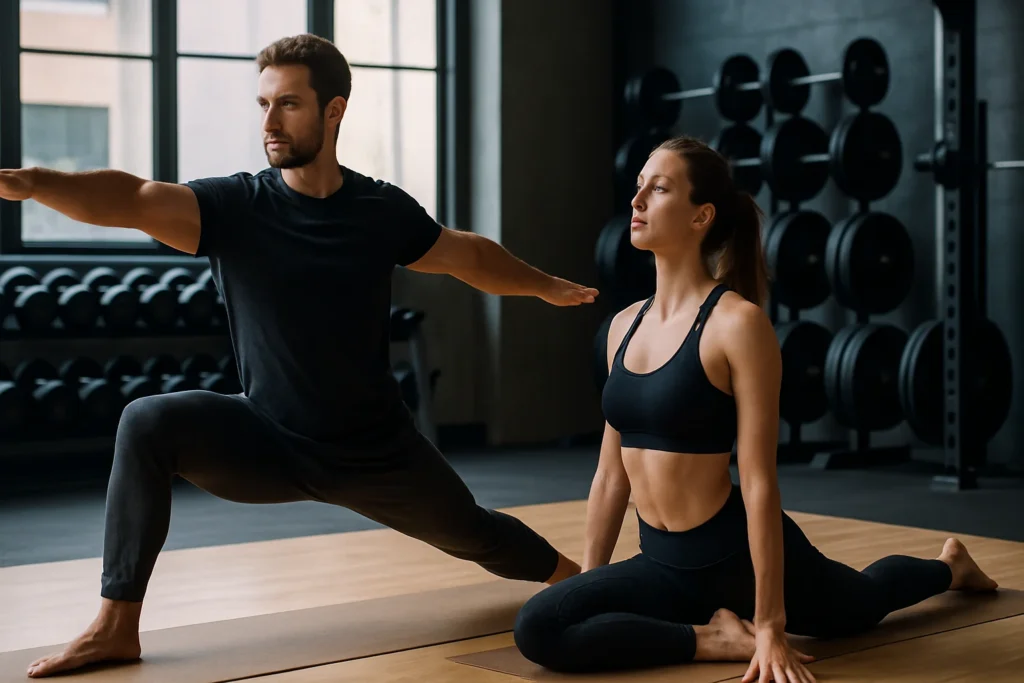
Does your mat start feeling like an ice rink the minute your palms get sweaty? You’re in Downward Dog, dialed in, and—whoop—your hands slide and the pose turns into a circus trick. If that rings a bell, you’re not alone; sweat throws off beginners and teachers alike. I’ve been there, and switching to a non-slip mat I could actually trust made all the difference. If you’re hunting for a non slip yoga mat sweaty hands won’t slide on, here’s what to look for. In this guide, I’ll share what works, plus the embarrassing moment that convinced me to upgrade for good. You can also check out our full yoga gear guide for more essential picks. Get ready to transform your flow from slippery to secure!
This page contains paid/affiliate links. As an Amazon Associate we earn from qualifying purchases, and we may earn commissions from other partners—at no extra cost to you. Links marked with ‘#ad’ are affiliate links, meaning we may earn a commission at no extra cost to you. Learn more.
Best Non-Slip Yoga Mats for Sweaty Hands
Top 3Tested in hot yoga & vinyasa for wet-grip, comfort, and durability.
ORW / OREN’S Hot Yoga Mat
What I use: sweat-activated PU locks in under heat; rubber base stays planted in hot studios.
- Best for: Hot yoga and heavy sweat
- Format: PU top + natural-rubber base
Premium Cork + Natural Rubber Yoga Mat
Nice alternative: natural cork grips better with light moisture—steady traction without a tacky feel.
- Best for: Moderate to heavy sweat, eco-lean
- Format: Cork top + natural-rubber base
Gaiam Performance Dry-Grip Yoga Mat
Starter pick: moisture-wicking top gives dependable grip for light–moderate sweat and easy commutes.
- Best for: Value and non-heated classes
- Format: PER/PVC top + cushioned base
Table of Contents
- Why Grip Matters with Sweaty Hands
- Grip 101: What Makes Mats Work When You Sweat
- Key Takeaways
- How to Choose the Right Mat for Sweaty Hands
- Comparison: Top Non-Slip Yoga Mats at a Glance
- Beyond the Mat: Boosting Your Grip
- Care Tips for High-Traction Mats
- Find Your Perfect Grip: Interactive Tool
- Frequently Asked Questions
- Conclusion: Elevate Your Practice with Better Grip
Why a Non-Slip Yoga Mat is Essential for Sweaty Hands
Imagine this: You’re in Downward-Facing Dog, feeling strong. Then, a bead of sweat drips onto your mat, and your hands slide forward. Your alignment falters, and you’re suddenly more focused on not falling than on your breath. This scenario is all too common for yogis with sweaty hands, and it’s not just annoying—it can be risky. Slippery mats may contribute to wrist strain, according to teacher reports and studio incident logs; choosing better grip can help reduce that risk. That moment in my first hot yoga class, when I slid into my neighbor during Warrior II on a budget PVC mat, reminded me to prioritize grip and comfort—staying steady supports focus and may help reduce strain.
A grippy yoga mat is more than a luxury; it’s your practice’s foundation. Without proper traction, you overcompensate—gripping harder with fingers or toes, straining small muscles, or losing balance. This disrupts the mental and physical benefits of yoga sessions, pulling you out of your flow. Fortunately, anti-slip mats are designed with materials and textures that provide traction, even when wet. They let you hold poses confidently, transition smoothly, and dive deeper into your practice without worrying about slipping. In short, a quality sweat-proof yoga mat is your ticket to stability and focus.

Understanding Grip: What Makes a Non-Slip Yoga Mat Sweaty-Proof?
Not every yoga mat can handle sweaty hands without slipping. The secret comes down to the materials and the surface design. Here’s what sets a truly grippy yoga mat apart when your practice heats up.
Key Takeaways
- Material counts most: Natural rubber, PU, or cork-on-rubber tops offer reliable traction when damp.
- Sweat-activated grip: PU and microfiber surfaces get grippier as you sweat—great for hot yoga.
- Care matters: Gentle, regular cleaning removes oils and keeps stickiness high.
Materials Behind the Best Grippy Yoga Mat
The grip of your mat depends on what it’s made of—both the top layer and the base. Here’s the scoop on the best options:
Natural Rubber
Natural rubber mats are a go-to for many yogis. Their open-cell texture absorbs sweat so you stay steady, and they’re eco-friendly with just the right cushioning for your joints.
- Pros: Excellent natural grip, sustainable, stable cushioning.
- Cons: Noticeable rubber smell at first, needs regular cleaning, a bit heavy, and not ideal if you have a latex allergy.
Polyurethane (PU)
PU tops—usually bonded to rubber—feel tacky when damp and really lock you in during sweaty classes.
- Pros: Standout wet grip, smooth feel, holds up well.
- Cons: Costs more, needs specific cleaners, can show hand/foot marks.
Microfiber/Fabric Tops
These feel like a bonded towel on top of rubber; they actually grip better once there’s moisture—perfect for hot yoga.
- Pros: Great for heavy sweaters, soft feel, often machine washable.
- Cons: Slippery when dry, needs moisture to grip.
PVC (Polyvinyl Chloride)
PVC mats might be light and budget-friendly, but they tend to get slick once you start sweating. Plus, they’re not the most eco-friendly choice, so many yogis skip them.
- Pros: Cheap, lightweight.
- Cons: Poor wet grip, less eco-friendly.
Texture and Surface Design
Texture plays a big role too. Smooth PU mats feel almost sticky, while rubber mats with subtle patterns help channel away sweat for extra traction.
Thickness and Density
Thickness doesn’t change friction, but it does change how stable and cushioned you feel:
- Thicker (6mm+): Plush for joints and slower practices.
- Standard (4–5mm): A nice balance of cushion and stability.
- Thinner (1–3mm): Ultralight and steady underfoot—great for travel.
In short, look for PU or natural rubber plus smart surface texture when you want steady traction in sweat.
How to Choose a Non Slip Yoga Mat Sweaty Hands Won’t Slide On
Finding your ideal sweat-proof yoga mat requires matching features to your needs and practice style. With the right traction-focused mat, you can focus on your flow, whether practicing in a studio or yoga at home. For more on enhancing your practice, explore the benefits of mindful movement yoga. Consider these factors:
Your Yoga Style
Your practice type influences grip needs:
- Hot Yoga/Power Flow: PU or microfiber shine with sweat-activated grip.
- Vinyasa/Ashtanga: PU or natural rubber keep you planted through dynamic work.
- Hatha/Restorative: Go for cushioning with decent grip—rubber is a safe bet.
Sweat Level
How much you sweat should steer your pick:
- Heavy Sweaters: PU or microfiber grips better as moisture builds.
- Moderate Sweaters: Open-cell rubber absorbs sweat and stays steady.
- Light Sweaters: Most quality mats will do—prioritize comfort.
Portability vs. Stability
Always on the go? Pick a thinner mat (3–4mm) or one that folds. Mostly studio/home? 5–6mm feels kinder on wrists and knees.
Durability and Eco-Friendliness
Aim for something that lasts and aligns with your values. Natural rubber or TPE can be solid choices; some models may carry certifications (e.g., OEKO-TEX® STANDARD 100) — check each product’s specs.
Budget
Yoga mats come in all price ranges—just choose the one that feels right for your budget:
- Premium ($100+): Splurge on brands like Liforme or Manduka for top-notch grip and quality.
- Mid-Range ($50–$100): Jade or Gaiam offer solid performance without breaking the bank.
- Budget ($30–$50): Brands like Heathyoga give you decent grip for less.
Comparison: Non Slip Yoga Mat Sweaty Hands Options at a Glance
We evaluated these mats to find the best non slip yoga mat sweaty hands can count on — tested for grip during sweaty vinyasa and hot yoga sessions, comfort for longer holds, and durability after repeated use. Here’s how they stack up:
| Mat | Material | Thickness | Price Range | Best For |
|---|---|---|---|---|
| ORW / OREN’S | PU + Rubber | 4mm | $50–$100 | Hot Yoga, Heavy Sweat |
| Premium Cork + Natural Rubber | Cork + Rubber | 5mm | $50–$100 | Moderate → Heavy Sweat, Eco |
| Gaiam Dry-Grip | PER | 5mm | $50–$100 | Light → Moderate Sweat, Value |
Beyond the Mat: Boosting Your Grip
Even with a high-traction mat, a few add-ons can make a big difference. Here are options to ensure your mat stays secure:
Yoga Towels
Microfiber towels soak up sweat and grip once damp—great for hot classes.
- Pros: Sweat-absorbing, machine washable, protects mat.
- Cons: May bunch up, needs moisture.
Yoga Gloves & Socks
Grippy pads on gloves and socks provide direct traction.
- Pros: Instant grip, great for travel, warm.
- Cons: Bulky, less grounding.
Liquid Grip
Liquid chalk offers dry grip for extreme hand sweat, though less common in yoga.
- Pros: Powerful dry grip.
- Cons: Messy, not for feet, overkill for most.
Caring for Your Non-Slip Yoga Mat
Proper care keeps your grippy yoga mat performing well, aligning with sustainable yoga practices by extending its lifespan.
General Cleaning Tips
- Wipe Down: Use a damp cloth or mat cleaner after each session.
- Avoid Harsh Chemicals: Skip abrasives or essential oils unless recommended.
- Air Dry: Let your mat dry completely before rolling.
Material-Specific Cleaning
- PU Mats: Use mild soap or PU cleaner, wipe gently, avoid alcohol.
- Rubber Mats: Clean with vinegar-water mix, rinse occasionally, avoid sunlight.
- Microfiber Mats: Machine wash on gentle cycle, air dry.
Storage Tips
- Roll, Don’t Fold: Prevent creases by rolling loosely.
- Avoid Sunlight: Store away from UV rays.
- Vertical Storage: Keep upright to avoid flat spots.
Find Your Perfect Grip: Interactive Tool
Find Your Perfect Non-Slip Mat!
Answer three quick questions to discover the best sweat-proof yoga mat for your practice. Recommendations reflect how these mats performed in our testing.
Recommended Mat:
Why it’s a great fit:
Frequently Asked Questions
Still unsure? Use our interactive tool above to find the perfect mat for your practice!
Conclusion: Elevate Your Practice with a Non-Slip Yoga Mat
Aim for steady, confident flows with a mat that supports traction. Whether you love hot yoga or a flowing vinyasa, mats made with PU, natural rubber, or microfiber can help keep you grounded. For long-term confidence, the best anti-slip yoga mats provide reliable grip in every class. Happy practicing! 🧘♀️


